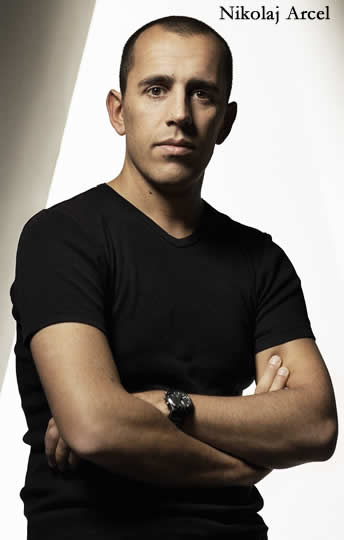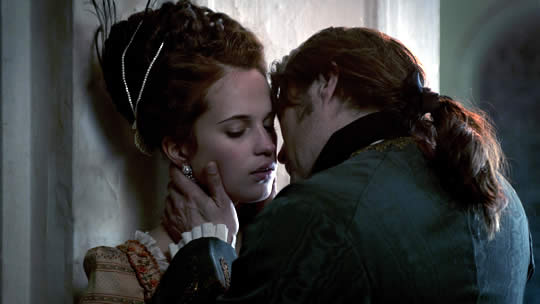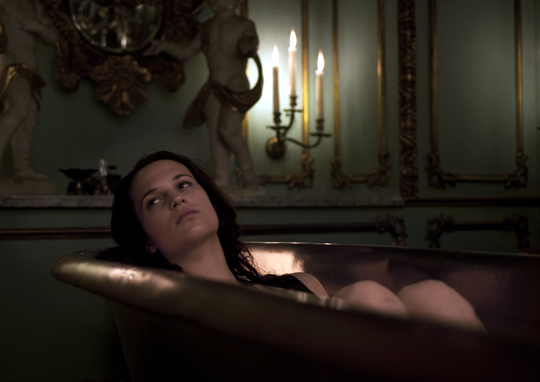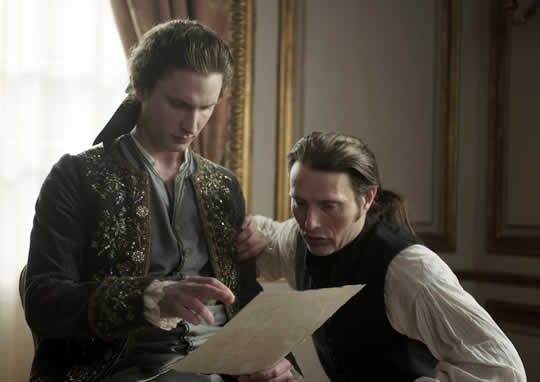 A ROYAL AFFAIR, a 2013 nominee for the Best Foreign Language Film Oscar, is the true story of an ordinary man who wins the queen’s heart and starts a revolution. Centering on the intriguing love triangle between the ever more insane Danish King Christian VII (Mikkel Boe Følsgaard), the royal physician who is a man of enlightenment and idealism Struensee (Mads Mikkelsen) and the young but strong Queen Caroline Mathilda (Alicia Vikander), A ROYAL AFFAIR is the gripping tale of brave idealists who risk everything in their pursuit of freedom for their people… Above all it is the story of a passionate and forbidden romance that changed an entire nation.
A ROYAL AFFAIR, a 2013 nominee for the Best Foreign Language Film Oscar, is the true story of an ordinary man who wins the queen’s heart and starts a revolution. Centering on the intriguing love triangle between the ever more insane Danish King Christian VII (Mikkel Boe Følsgaard), the royal physician who is a man of enlightenment and idealism Struensee (Mads Mikkelsen) and the young but strong Queen Caroline Mathilda (Alicia Vikander), A ROYAL AFFAIR is the gripping tale of brave idealists who risk everything in their pursuit of freedom for their people… Above all it is the story of a passionate and forbidden romance that changed an entire nation.
Nikolaj Arcel, Danish writer and director of A ROYAL AFFAIR was born in 1972. Nikolaj is a graduate of the National Film School of Denmark, 2001. His graduation film WOYZECKS’S LAST SYMPHONY won top awards at Munich and Clermont-Ferrand. In Tel Aviv, Arcel received the award for Most Promising Director. He wrote the screenplay for the award-winning children’s film KLATRETØSEN/CATCH THAT (2002). His feature film debut KING’S GAME (2004) was number one on the Top-20 chart and seen by over a fifth of the population in Denmark (cinema & TV). The film won a number of national awards and including Best Screenplay (for Arcel and co-writer Rasmus Heisterberg) at Viareggio. ISLAND OF LOST SOULS (2007) was a winner in Chicago and Leeds and swept up five Danish Film Academy Robert Awards. Arcel and Heisterberg teamed up again with scripts for the animated feature JOURNEY TO SATURN (2008) and Niels Arden Oplev’s Swedish film THE GIRL WITH THE DRAGON TATTOO (2009), as well as Arcel’s third feature TRUTH ABOUT MEN (2010).
Bijan Tehrani: In A ROYAL AFFAIR, you have a very interesting new way of looking at history. It’s almost like a current film. Tell us a little bit bout that.
Nikolaj Arcel: Yes, I really wanted to make a historical film but I wanted to try to make it a little bit fresh and a bit modern so I told the creative team that I wanted to make sure we filmed as if we were shooting a modern film and not an old-fashioned piece. So we pretended to be going back in time and filmed as a modern crew. Of course we used settings and costumes but in terms of film language, we used techniques seen as more modern such as handheld or intimate shots. We didn’t do those old-fashioned dolly or crane shots. So that was the idea from the start: to make a more modern version of a period drama.
BT: You could also see this approach in your way of dealing with the characters: the mad king is not a devil person or the physician is not completely a hero, he has his weaknesses. The approach to the characters was also real and interesting. Tell us about the way you approached the characters.
NA: Since it’s a true story, what you have to do when you write the script is go back and figure out what these characters are all about and what they were in real life… so we really worked I think for a whole year on just doing research and reading on who they were in real life, in letters and witness accounts and tried to figure out the complexities of these characters. And that’s the beauty of doing a true story: sometimes when you come up with your own ideas you tend to make the characters a little more black and white and it may be more fitting for a film but if you have real characters you can make them maybe a little more complex and three-dimensional because you know the stages that they played… For instance, you have the doctor who is of course a hero but he becomes slightly corrupt in the end. You have the king who is of course slightly mad, but he is also a sympathetic character towards the end, and he’s a very sad character that you feel pity for. And you have the queen who also becomes in a very dark state toward the end. So I think it’s interesting that you can take these characters on a long journey throughout the film and that they change, they’re not always the same.
BT: Even though the story happens in a totally different era and is very eye-opening as to what life was really like and what the real issues were, it is also about our time. We see the same themes repeated in a way.
NA: Yes, I was always very conscious of that.
BT: Tell us about writing the screenplay. How close is the film to the screenplay and how much did you allow improvisation? How much if at all did you change from the script?
NA: Improvisation is nearly impossible when you are doing a historical drama because the actors could not make up dialogue that would sound like characters from that time period. The film resembles the script a lot but what we did was every night, I would go over the scene we were supposed to shoot for the next day with the actors and we always changed some ideas and a little bit of dialogue. I always do that on my films – I feel it needs to be fresh and people always have ideas about the scenes. I think it’s important right before a scene or the night before to sit down with the actors and say – what could make this scene even better? Is there too much dialogue? Not enough? Can we say this without dialogue? But I will say the final film resembled the script pretty closely.
 BT: How did you go about casting the actors? They are so well cast you could not imagine anyone else to play their part.
BT: How did you go about casting the actors? They are so well cast you could not imagine anyone else to play their part.
NA: I absolutely agree. I think I was very lucky with this casting. First of all, I cast Mads Mikkelsen, who is obviously a big star here in Denmark. I knew I wanted him for the part of the doctor and I was fortunate enough that he said yes quite quickly. So I had to find these young actors for the king and queen. That was slightly more difficult. I had to cast for many months to find these actors. Finally I decided to go with two unknown actors. The queen was played by an actress who had only done one independent Swedish film and she had to learn Danish for the part. The king was played by a young man who had never been in a film or a play before. He was actually in drama school when we cast him so this was his first part. But I felt it was interesting to cast completely unknown actors around Mads who is very well-known. I think it makes it more believable that, from a Danish perspective anyway, these are people you don’t know from a lot of other films.
BT: When you see the part of the king played by Mikkel Boe Følsgaard, it’s like he’s been an actor forever. How did you work with him?
NA: I was very tight meaning I spent a lot of time with him rehearsing and going over the character before the shoot to make sure he understood the part and on the set I also gave him a lot of space to do different versions of different takes. He was allowed a lot of freedom to play around – one quiet version, one loud version… He had a very good understanding of the king but he also of course needed to do those slightly crazy things, these mood swings… So we played the scenes in those varying moods and I decided later in the editing room which ones to choose.
BT: I think any director in the world is very lucky to work with Mads Mikkelsen. He is such a wonderful actor! This is quite a different part for him: how did you work with him and how did you feel working with him?
NA: I think it’s one of the best experiences I’ve had in my life. He is such a great actor and also a great person to work with. He ‘s an extremely focused actor and he was very happy to play this part because he had been playing a lot of “bad guy” roles in America. Coming home to Denmark after five years and playing this big popular Danish hero was interesting and different for him. He was very focused and had ideas every night, he really wanted to give everything that he could so that he could play the part the way we imagined it. It really was a great experience working with him!
BT: What was your approach to the use of music in the film?
NA: The composer is Gabriel Yared, who is one of my big idols of all times in terms of music and film composers. He has done some very big scores for various French films, he actually won an Oscar for The English Patient, he also did Talented Mr Ripley and various other great scores… so I was a very big fan of his and I thought he was the only one who could do the music. So I approached him in Paris and asked him whether he would consider doing this small – relatively small Danish film, and I was lucky that he liked the script and he agreed. He’s a very classical composer and the film needed that – I am very happy with what he did.
BT: How do you see the chance of the film winning an Oscar for Best foreign Language Film and how do you think that would affect the film and you as a filmmaker?
NA: I think it’s already had all the impact we could dream of because the nomination alone has been very good for me and very good for the film, and I think that’s a great honor in itself to have been nominated. Who is going to win? I have no idea. There’s always a chance but I won’t think too much about it, I will just see what happens.

